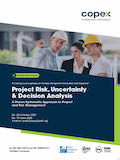- Home
- Course Finder
- Training Categories
-
- Corporate Governance and Compliance (GRC)
- Management & Leadership
- Finance & Accounting
- Agility Learning
- Project Management
- Purchasing & Supply Chain Management
- Manufacturing & Production Management
- Transportation & Traffic
- Imports & Exports
- Insurance & Retirement
- Ports & Shipping
- International Trade & Customs
- Facilities & Asset Management
- Contracts Management
- Maintenance & Engineering
- Oil and Gas Training
- Energy Training
- Health & Safety
- Digital Savviness & AI
- Blockchain & Financial Technologies
- Construction Management
- Cost Control & Optimisation
- Human Resource Management
- Robotics and Mechatronics
-
- In-House Training
- Venues
-
- Sao Paulo - Brazil
- Abu Dhabi - UAE
- Accra - Ghana
- Amsterdam - The Netherlands
- Barcelona - Spain
- Cairo - Egypt
- Dubai - UAE
- Geneva - Switzerland
- Houston - USA
- Istanbul - Turkey
- Kuala Lumpur - Malaysia
- Lisbon - Portugal
- London - UK
- Luanda - Angola
- Madrid - Spain
- Milan - Italy
- Munich - Germany
- Muscat - Oman
- New York - USA
- Paris - France
- Riyadh - KSA
- Rome - Italy
- San Francisco - USA
- Seoul - South Korea
- Vienna - Austria
- Windhoek - Namibia
- Zurich - Switzerland
- Krakow - Poland
-
- Certificates
- About Us
Training course overview
Understanding the complexities of Public-Private Partnerships (PPP) is crucial for project professionals, as these schemes vary widely and require specific skills to manage stakeholder expectations and navigate organizational boundaries effectively. This Coventry Academy training course is tailored to professionals from diverse backgrounds, aiming to equip them with essential skills for successful PPP preparation. Daily topics guide participants through the journey from project identification and selection to conducting comprehensive feasibility studies. Throughout the course, emphasis is placed on managing stakeholders, defining roles and responsibilities, addressing various issues, and evaluating and mitigating risks inherent in PPP projects. By mastering these elements, participants will gain the expertise needed to contribute effectively to the planning and execution of PPP initiatives, ensuring they can navigate challenges and maximize project outcomes.
What are the goals?
By attending this Coventry Academy training course you should achieve these goals:
- How to Recognise the Various PPP Schemes
- Understand the Impact and Contractual Issues
- How to Determine Project Identification
- How to Analyze the Correct Feasibility Study Required
- How to Manage Stakeholder Expectations
Who is this training course for?
This Coventry Academy training course is suitable to a wide range of professionals from Policy Makers to Technical and Financial Consultants, but will greatly benefit those professionals who have some experience with infrastructure projects and wish to improve their knowledge and decision-making capacity to enact policies related to PPPs. It will also be of great benefit for professionals in Sectors that include: energy & electricity, water & waste water, transportation (roads, airports, ports, and rail), telecommunications, education, health, and municipal services.
Course Outline
Day One: Project Pre-Feasibility Analysis
Key behaviours:
- Perform a comprehensive Needs Analysis
- Understand the different types of feasibility studies required for any PPP project
- Distinguish between the needs and wants in the project scope
- Interpret and identify social and environmental safeguards
Topics to be covered:
- Needs and options analysis
- Legal feasibility
- Technical feasibility
- Scoping social/environment safeguards analysis
- Preliminary financial viability including expectations of required Government financial support
Day Two: Defining Public-Private Partnerships and Setting the Framework & Structure
Competency Description: It is essentially important that personnel involved in any PPP project understands the full scope and context of the various PPP schemes.
Key behaviours:
- Appreciate the fundamental concepts of the PPP scheme
- Understand the different types of PPP contracts
- Know and understand the critical phases and levels of a PPP project
- Appreciate the rationale behind market needs
Topics to be covered:
- Rationale, aim and motivation for engaging PPP
- Key phases of the PPP project process
- The structure of the PPPs
- Different types of PPPs
- The four levels of preparation and implementation
- Analyse the important factors for the project preparation process
Day Three: Key Decision Criteria to Identification of PPP Projects, PPP Screening & Cost Benefit Analysis
Competency Description: Many vital decisions have to be made and PPP project professionals must recognize and understand the various options in order to make the right decision for a sustainable and successful PPP project.
Key behaviours:
- Appreciate Understanding and knowledge of investment models
- Know how to select suitable PPP projects
- Knowledge and insights of the different PPP models
- Analysis of cost benefits
- Decision making abilities giving value for money
- Perform a basic project appraisal
Topics to be covered:
- Public investment delivery model
- Economies of scale and project grouping
- Analysis of cost benefits of a PPP project
- How to get value for money in PPP projects
- Commercialisation potential analysis
- Market potential
- Capacity of assuming long term commitments
Day Four: Basics of Project Preparation: An Overview of its Key Components
Competency Description: A critical success factor in any PPP project is understanding the various components and best practice to prepare and implement a comprehensive project implementation plan.Key behaviours:
- Develop a practical ability to identify and mange project risks
- Understand the importance of financial and economic analyses
- Interpret costings estimates and impacts
- Decipher payment mechanisms in PPP projects
- Develop and implement practical project plans
Topics to be covered:
- Project identification, risks, sustainability
- Project design: Tender strategy, technical aspects, components, cost estimation, and financing
- Structuring a PPP contracts
- How to avoid common pitfalls
- Importance of project financial and economic analysis
- Understanding and applying payment mechanisms
- Preparing the Project Implementation Plan
- Project Management Arrangements – Various types of agreements and monitoring indicators
Day Five: Planning for PPP Project Management, Project Operations and Hand Back
Key behaviours:
- Appreciate the importance of proactive project management strategy
- Know the fundamental concepts of project management
- Identify the challenges parties face in a PPP projects and how to overcome them
- Choose the right people and skills for the various roles
- Formulate clear and concise management plans
- Appreciate the strategic objectives of stakeholder management
Topics to be covered:
- Appointing a PPP project manager and project team (Project Implementation Unit)
- Key roles within the project, including decision-making authorities, and sources and funding for assistance
- Preparing the project plan
- Dealing with main challenges of a PPP project
- The absolute importance of stakeholder consultation and managing the interface
- Risk assessment and analysis
- Going beyond the construction phase to ensure success in Operations
- Hand back of asset upon contract expiry
The certificate
- Coventry Academy Certificate of Attendance will be provided to delegates who attend and complete the course






